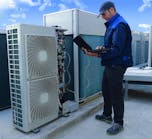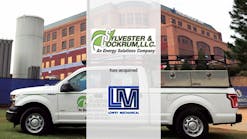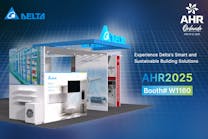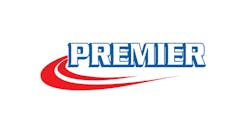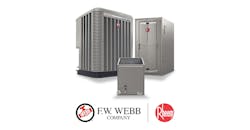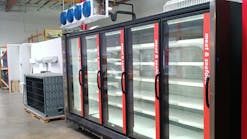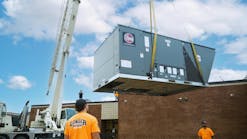The variable refrigerant flow (VRF/VRV) market is booming in North America and the Pacific Northwest is one region that’s leading the surge.
Mini-split air conditioner sales, in particular, are flourishing due to utility rebates, greater HVAC contractor acceptance, claims of increased air comfort and efficiency over competing methodology and the labor/material savings of eliminating ductwork. An example is the utility rebates facilitated by the Northwest Ductless Heat Pump Project, a Portland, Ore.-based initiative of the Northwest Energy Efficiency Alliance, according to HVAC manufacturer’s representative, Scott Herberg, principal Pacific NW Reps LLC, Yakima, Wash.
On the cusp of this wave is Steelhead Mechanical, which has been installing VRF regularly for several years and is scoring lucrative large multi-family housing unit HVAC projects with its experience. Consequently, Shawn Talley, manager at the Spokane, Wash.-based commercial contractor, has developed a variety of techniques for large-scale VRF projects that save building owners money, cut waste but also result in quality and prevent callbacks.
Illustrating VRF’s popularity is a recent 270-unit multi-family rental housing project where Steelhead Mechanical offered the real estate developer a variety of HVAC methodologies, but multi-zone mini-split technology won out. As the Design/Build contractor, the 15-year-old company offered choices of conventional split systems with heat pumps and ductwork; packaged terminal air conditioners (PTAC); mini-splits in the main room with electric heat in the bedrooms; or multi-zone mini-splits with one condenser and up to three evaporator coils per apartment, depending on the number of bedrooms. The developer chose the latter for the Spokane project, because its air comfort is equal to the conventional heat pump split system, but without the added labor/material expense and space constraints of ductwork and a closet air handler.
Steelhead specified 2- and 2-1/2-ton model 38MGRQ mini-split condensers and 40MAQB 3/4 and 1-ton evaporator coils by Carrier division of United Technologies, Farmington, Conn., and distributed by the Spokane branch of Carrier wholesaler, Airefco, Tualatin, Ore. All two and three bedroom units are controlled by a thermostat mounted below the evaporator.
Steelhead helps make VRF competitive with conventional HVAC by cutting VRF job labor and increasing installation efficiency. One method is Talley’s option to always rough-in mini-split linesets, drain hose and communication/electric cables using a RoughinBox, by VRF air conditioning accessory manufacturer/importer Marketair, Edison, N.J. Steelhead installed RoughinBoxes for all 630 evaporator coils.
A RoughinBox fits between wood or metal studs at 16-inch centers to provide an easily accessed enclosure for the lineset, cables and drainage point. This allows the installer to terminate these services securely in a closed box. It fully protects the connections from damage by other trades, presents a stable frame for the sheet rock installer to work around and facilitates the final connections when the evaporator coil is installed and commissioned.
Typically, linesets and electrical cables are left exposed prior to sheet rock installation and are invariably subject to severe damage by other trades during building operations. Furthermore, the drainage connection is also left exposed and is subject to blockage from airborne debris such as sheetrock finishing dust and insulation.
A rough-in box also saves time in most cases. “If a RoughinBox saves just five or ten minutes installation time with a project, such as this where there’s hundreds of evaporator coils, it adds up to a tremendous labor savings,” said Dylan Bovee, account manager, who worked with colleague Mike Hudson, Airefco’s ductless manager, to assist Steelhead in the engineering design.
Talley opted for rough in boxes for quality control as well as professionalism and aesthetics. Years ago, Talley recalls an occasional drain hose becoming disconnected, which prompted him to use rough-in boxes exclusively to eliminate callbacks. The rough-in box helps keep the condensate gravity drain piping securely connected.
“Most building construction managers will check progress during each phase of completion and when they see rough-in boxes instead of linesets, wires and drain points sticking out of an unfinished wall, it presents a much more professional appearance,” said Talley. “Obviously the future tenant will never see it concealed in a wall, however building owners typically request rough-in boxes once they’ve experienced them in past projects. I’ve never had a building owner tell me they didn’t want to pay for rough-in boxes,”
Steelhead’s mass production technique is continued into the second step by installing all the linesets into their respective rough-in boxes and connecting them to outdoor termination boxes, followed by setting ventilation fans and dryer vents. All condensers are set, then evaporators are mounted and connected. Finally, a crew charges each system and operates it for performance. Versus installing one complete system at a time, the mass production strategy saves significant labor time, according to Talley.
The other HVAC parts of the project included three Carrier two to four-ton gas/electric conventional split systems installed for the complex’s 5,000-sq.ft. clubhouse.
Talley sees a bright future in VRF, especially in the northewest, because of the IAQ it provides and the costs it can save developers, especially for large scale projects such as both new construction and retrofit multi-family housing units.
Marketair is an importer, exporter, manufacturer and distributor specializing in components and accessories for the HVAC industry. Headquartered in Edison, N.J., Marketair has acquired several innovative new products for commercial and residential HVAC applications, covering both the ducted and minisplit (ductless) sectors.
